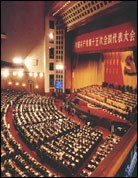A senior Chinese official said that China's macro-economic control
measures during the ninth Five-Year Plan period (1996-2000) have achieved
prominent results, with the national economy maintaining sustained
growth.
Zeng Peiyan, minister of the State Development Planning Commission,
told Xinhua in an interview that during this period, China implemented
pro-active fiscal policies while firmly expanding domestic demand.
The country also successfully overcame difficulties resulting from
the Asian financial crisis and accomplished major tasks set in the
five-year plan.
He said that the successful implementation of macro-economic control
measures have created a beneficial environment for promoting reforms,
exploiting existing productive forces, easing employment problems
and protecting social stability.
During the ninth Five-Year Plan, the control of inflation was the
primary task of macro-economic control and high inflation was effectively
reined in to achieve a "soft landing", he said.
In the second half of the five-year period, China implemented the
pro-active fiscal policies, adopted a series of stable monetary
policies and effectively controlled a deflationary trend by issuing
treasury bonds, expanding investment and taking other measures,
thus sustaining the growth momentum of the national economy.
He said that since 1998, China has issued 360 billion yuan in treasury
bonds. The money was mainly used to build infrastructure projects
in areas of water conservancy, transportation and power; to support
technological advancement in enterprises; to increase investment
in an ambitious national program to develop China's western areas
as well as biological and environmental construction; and to increase
input in education, scientific and technological infrastructure.
Since 1996, the central bank has lowered deposit and loan interest
rates for seven times, exploited many monetary policy tools and
appropriately increased money supply to motivate social investment,
which gave a powerful drive to the country's economic growth.
Meanwhile, attention was also paid to coordinated expansion of investment
demand, readjustment of income distribution policies and kick-start
of consumption demand, he said.
In 1999, while continuing to expand investment in fixed assets,
China implemented a series of policy measures including wage increases,
timely compensation for laid-off workers, pensions for the retirees
and increases in farmers' incomes, in order to readjust income distribution
and encourage consumption.
"These measures effectively boosted consumption and spending,
resulting in a condition of driving up the economic growth by both
investment and consumption," he said.
While expanding domestic demand, China has adopted effective measures
to boost export, including the improvement of export tax rebate
policies, raising export tax rebate rates, expanding the foreign
trade rights of productive enterprises, improving export credit
insurance mechanisms and increasing banks' support to foreign trade
enterprises.
He said that another focus of the macro-economic control policies
is accelerating structural readjustment, which includes readjusting
agricultural planting structure, increasing investment in infrastructure,
guiding enterprises to increase input in technological upgrading,
supporting medium- and small-sized enterprises and promoting the
development of China's western areas.
Judging from present conditions, most of the macro-economic control
targets in the ninth Five-Year Plan will be reached, Zeng said.
During the five years, the annual average growth of GDP was approximately
eight percent, with the natural population growth rate being lower
than 10 per thousand. This year, China's per-capita GDP is expected
to exceed US$850. Total foreign trade volume will surpass US$400
billion and foreign exchange reserves will double that of 1995.
According to the minister, the registered unemployment rate in urban
areas will be lower than four percent, poverty continues to decrease
and the country's poverty-relief plan will be realized by the end
of this year.
"From the practices in recent years, we not only have had successful
experiences in controlling inflation, but also found some effective
measures in expanding domestic demand, promoting economic growth
and prohibiting the tendency of deflation," he said.
He added that these comprehensive macro-economic control measures
have largely enriched China's macro-economic control policies, gradually
formed a comparatively complete macro-economic control policy system
and provided a guarantee for sustained, fast and healthy development
of the national economy.
(People's Daily)
|

